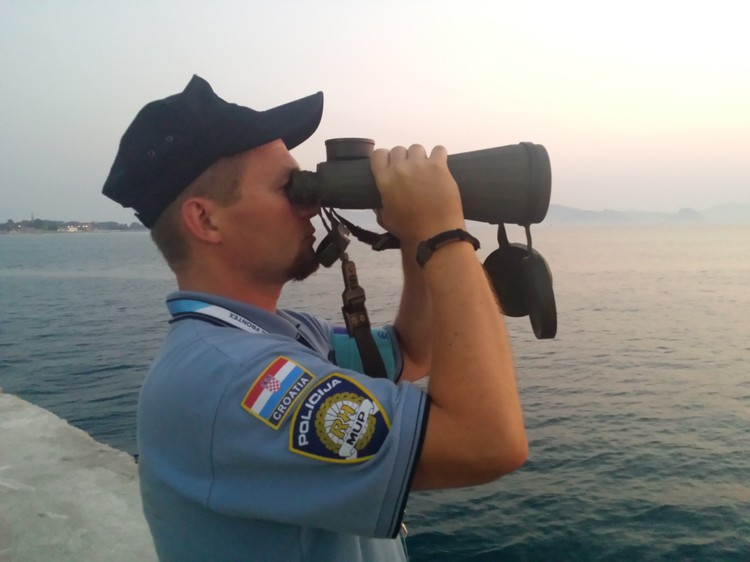Working in the field creates certain expectations. You must be trained; you must be fit; vigilance is your best friend. You are perceived as strong and rigid. But what many do not see is that behind the strength and the navy-blue uniform with a Frontex logo on the back, and epaulettes with a ‘border guard’ badge, there are people with aspirations and unusual hobbies.
Mihovil is an EU border guard from Croatia, currently deployed in Pirot, Serbia. Miha, as he’s known to his friends, can be deployed to different operational areas as a border guard and patrolling officer. The deployment to Serbia comes after some long experience with Frontex.
“I joined Frontex in 2016 as a national officer seconded for short-term missions,” Miha says, “so initially, I had a few training visits to different countries and was sent to Greece (Kos & Chios), Albania (Korçë), and Lithuania (Vilnius). I was usually a border guard there. In 2020, I applied for long-term deployments and now I find myself in Serbia.”
Patrolling borders is what Miha knows very well. Recently he was posted to a local coordination centre to work on night-vision systems, equipment, and cameras providing safety from afar. “I like to think that I was the all-seeing eye for my colleagues in the field, providing them with detailed descriptions of what was happening all around them in the dark.”
What looks like a nice metaphor is actually the first indication of Miha’s active imagination and creative mind. However, this requires a leap back in time.
Charity begins at… Frontex
Working for Frontex as a standing corps officer is not the same as working for Frontex at headquarters. Every day, Frontex officers deal with colleagues and people arriving from different corners of the world. A border crossing is not their destination, but as the name rightly suggests it becomes a place where their paths intersect. Sometimes for a minute, sometimes for a day. Some migrants will show their documents and continue on their journey, and others will wait longer for clearance, but there are more complicated cases – the undocumented migrants and the refugees. The guards are often the first ones to greet them.
And then there are also border-area communities, which witness the migratory flows on a daily basis. They are also the first ones to notice migrants and often understand the border as well as the guards. All of them, the border guards, the migrants, and the local communities are inter-related and, to some extent, depend on each other. Where Miha was deployed, he was always able to see ‘beyond the border’ and realise that his job as a Frontex officer was also to know the local community and their needs.
“We all need help at some point in life. I'm no different. With the war in Croatia, the path of my life changed overnight. As a 5-year-old child, I became a refugee and discovered a cruel world of social impotence. Someone always needs help out there. That could mean a soft, warm hug; it could be just a smile. Often, it's about a soothing voice or a tap on the shoulder. Since I am very sensitive socially, I want to change how people perceive ‘someone dressed in a uniform’. We aren’t all macho types, not at all! That’s a great big NO-NO! The reality is very, very far from this.”
In practice, getting to know the local communities is what Miha has done since day one of his deployment. He is always forging connections with people. His colleagues always joke that “everyone knows Miha”. When he walks the streets, everybody greets him. One of the reasons for this is that Miha likes to adapt quickly and to feel the beating heart of the place where he is deployed.
“In my last 2 years of service with Frontex, I laid the groundwork for a couple of charities. The first one was in Albania. Together with other standing corps officers and border guards, we helped five of the poorest local families just a few days before Christmas by providing them with food and school equipment. The second charity was in Greece. We provided equipment for a school for kids with special needs.”
All done in his free time, but not without a tangible gain for the service. Once you know the border community and its problems, you also begin to understand the migrants at that border crossing, and it is this human-to-human practical psychology that develops professional, savvy border guard team members.
Frontex is strong because of its people. Slowly but surely, its presence is becoming more visible. After two years of gathering experiences, now is the time to hear their stories. Each will be different. Each will have Frontex at its heart.
“When we wear our uniform,” concludes Miha, “we all look the same but inside we are totally unique and different.”
